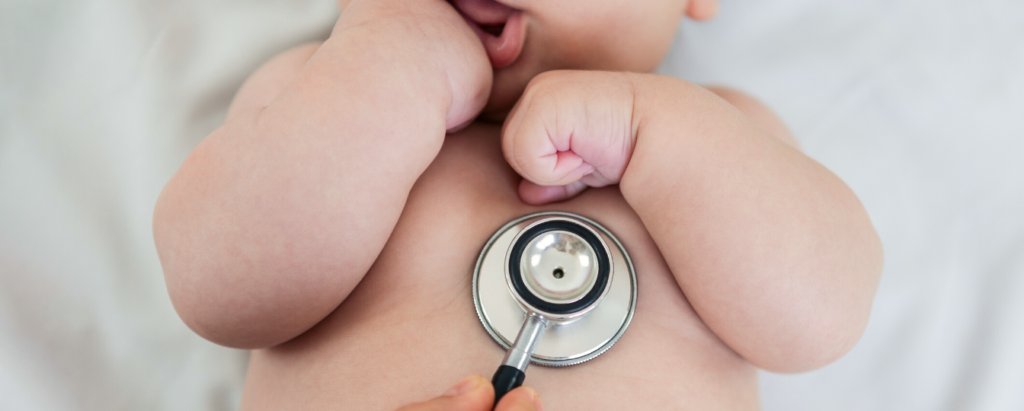Now that your baby has finally arrived, you’ll want to do some regular checkups to make sure their health is on track. Even perfectly healthy babies go to the doctor often, at least during the first 2 years after birth. This is because the first years from birth are crucial to a child’s growth and development. It’s good to keep up with doctor’s recommendations to have close tabs on your baby’s progress.
So when should you start going to the pediatrician, and what should you expect on your first visit? This cheat sheet should help you know what’s in store for the baby’s first doctor’s visit. See how to prepare here.
How Often Do Newborn Babies Visit the Doctor?
A baby’s first pediatrician visit comes at around 3 to 5 days old, or at 2 to 3 days after the baby has finally come home from the hospital. From there, the first year of birth is marked by several important routine check ups to help you and your doctor continue to monitor your health and development. These check ups, also called “well-baby visits” happen at least 6 times before the new born’s first birthday. As the baby grows quickly, it’s important to follow doctor’s recommendations to help you catch any potential problems early. These visits are also helpful for new moms to ask the doctor any questions that may arise about parenthood and their child’s development.
Questions to Ask Your Pediatrician at the First Visit
Every family’s story is different. Every mother will come to their baby’s doctors appointments with their own unique set of questions and concerns. However, if you’re looking for examples of questions you can consider asking, here are a few of our top picks.
Baby’s Diet
- How much should I feed my newborn?
- When should I stop breastfeeding?
- Should I follow a feeding schedule?
- How can I know if my baby ate enough?
Baby’s Sleep
- How much sleep should my newborn get?
- Should my baby follow a sleeping schedule?
- How can I get my baby to sleep through the night?
- Is it okay if I wake up my baby to eat?
Baby’s Development
- When should my baby start responding to sound?
- When should my baby start raising their head?
- What can I do to help in my baby’s development?
Baby’s Well-Being
- How much crying is normal?
- How many diapers should my baby use a day?
- How should I bathe my newborn?

What Do Doctors Check During the First Year of Birth?
After the first doctor’s visit, pediatricians usually follow a baby checkup schedule recommended by the American Academy of Pediatrics.
The schedule for a baby’s first year is as follows. One check up visit at:
- 1 month old
- 2 months old
- 4 months old
- 6 months old
- 9 months old
Of course, if you are concerned about your baby’s health at any point before your next visit, don’t wait and visit the doctor immediately. During these regularly scheduled visits, your pediatrician will cover a variety of topics about your baby’s growth. Below are some of the topics and tests you can expect to go over.
Taking Measurements
During every visit of the first year of birth, expect the doctor to always measure the baby’s length (which will eventually become their height), weight and head circumference. Recording these measurements helps the doctor compare them to average growth charts to track how they are growing compared to other infants their age.

Physical Exam
Head-to-toe exams are normal during the first year of check ups to get a full picture of their development. Every visit the doctor will also check the baby’s eyes, ears, and mouth, hear their heartbeat and lungs with a stethoscope, check their skin’s health, look at their tummy, hips, legs, and genitalia to examine that everything looks healthy. They will also check the baby’s head to note the growth of their skull.
Immunizations & Screenings
During the first year, the baby will also go through a number of immunization vaccines and screenings to prevent and detect illnesses. Some of the vaccines they may receive during the first year include Hepatitis B, Diphtheria-Tetanus-Pertussis (DTaP) vaccine, Haemophilus (Hib), Pneumococcal (PCV), Poliovirus (IPV), and Rotavirus Vaccines. They may also be screened for diseases and disorders such as anemia, metabolic disorders, or even autism.
Keeping up with well-baby visits is not only important for their development and growth, it can also be a great way to prevent small issues from becoming bigger health concerns. Each visit is an exciting milestone in your baby’s story. These visits are a great time to reflect on your baby’s health and ask your doctor for advice and recommendations to help make your life easier too!
While well-baby visits are not required by law, they can be crucial in a child’s first year of life. Skipping these visits can lead to missing important health or developmental problems that can delay treatment options. If you are still at the family planning stage and looking for support during your journey don’t hesitate to reach out to the Red Rock team. You do not have to be alone during this process! Contact Red Rock Fertility to schedule an appointment and consult with one of their fertility specialists today.



